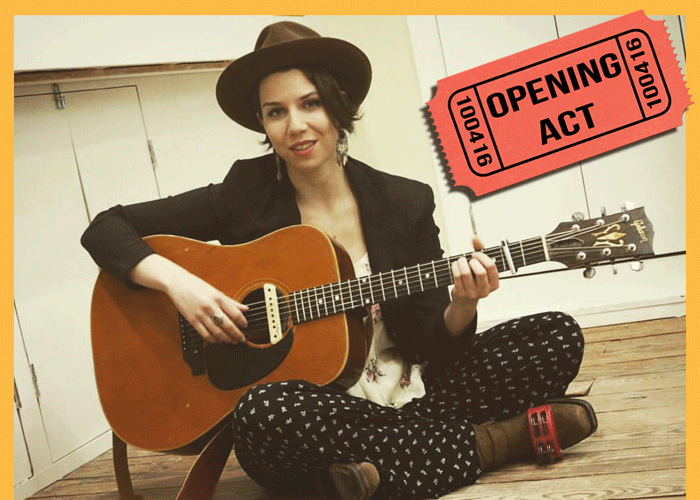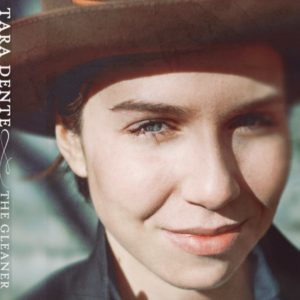
Artist/Band: Tara Dente
Website: www.taradente.com
Hometown: Long Branch, NJ
Latest Album/Release: The Gleaner (Album release show: May 13th / Online release: June 2nd)
Influences: The Boys: Johnny Cash, Nick Drake, The Shins, Jacob Dyln. The Girls: Brooke Fraser, Enya, Sarah McLachlan, Imogen Heap. (Among many others)
TrunkSpace: How would you describe your music?
Dente: I see things psycho-socially, so I would want to start by looking at the interrelation of my environment and my own views to describe my music. As a sound bite, I would describe my music as percussive/pensive folk/Americana, with Celtic and spiritual influences in the song structure. Others have consistently used words like “haunting”, “unexpected” (in reference to the melodies), and “interesting style” (when talking about the element of finger picking and picking patterns I use). Here’s the long story. I grew up in church, so much of the music I heard from a young age and on a weekly (sometimes daily) basis was “spiritual” music. So there was a depth of emotion and seriousness to the music, and content, or lyrics/topics. I think this exposed to me the concept of music moving me very deeply and being held in a certain reverence. There wasn’t a lot of “worldly” music being played in the house I grew up in, so I didn’t start hearing classic rock and pop until middle school here and there, a little more in high school, and then buried myself in 60s/70s folk, alternative, indie and Celtic-inspired music in college. I was dating someone for a long period of time who made me aware of a lot of good music, everything from Jimi Hendrix and Verve in high school, to Sigur Ros, James Blake, and The National in college. I went to church until I was about 20, and was fortunate to have met a lot of talented and creative people in those interactions and relationships. They helped to nurture my creativity and give me tools to play. Some of the people who really helped me along from that period include Allie Moss, who is a very talented singer/songwriter, guitarist, vocal coach (she gave me some lessons), who is known for her work with Ingrid Michaelson, and for her solo work. She gave me my first guitar. I’m very grateful to her, especially for helping to develop my voice. Myke Scavone was very encouraging from a young age, giving me words of wisdom, a space to practice when Allie lead a youth band in church, and asking questions to get me thinking about my direction. I appreciate his kind and steady presence in my youth as a developing artist. Myke is better known as the frontman of The Doughboys as well as a recent addition to The Yardbirds. Justin Leblanc helped to give me a platform in another band I joined and helped to lead on and off. I played mostly piano then (it’s my first instrument since I was young), and picked up guitar in my early 20s. The last church I was a part of called ORB (Outreach Red Bank, at the time), had a band called The New Ancients who built off of old hymns to create an indie, Sufjan Stevens-style sound. I was able to contribute to vocals and piano. Working with them, and the band leader, Pete Andrews (of Big Mechanical Bull / Submergent Music in Middletown, NJ), was a privilege and great experience for meeting some good friends and musicians who are still active in the NJ scene. I continued to play piano in college (I started at Brookdale) and considered studying music, specifically Jazz piano, often enjoying the feel of weighted keys built into digital pianos. I purchased a Rhodes piano and experimented with looping and a little bit of self-taught jazz theory, but quickly realized that for me, acoustic guitar was conducive to songwriting. My area of study became psychology. I realized there was a shit-ton for me to learn about myself, the world, my family, my purpose, and generally was just curious about the human condition. The same boyfriend who steered me toward good music, also steered me toward philosophy, introspection and question-asking. I’m grateful to have had his influence as my mind was developing and opening. Through my years of study and then work in the mental health field, I would retreat on my own to a quiet place where I could fiddle around on guitar, come up with some little melodies, write some lyrics, or use poetry previously written. There was absolutely no pressure on me to make anything. Whatever I wanted to create, I could create. No one knew I was writing and playing. It was a space for me to do whatever I wanted. I would often write songs without traditional structure; maybe there was no chorus, or the whole song was one loop on repeat. Most of my songs were only a couple minutes long. I liked writing without structure. Later on, I began to write fuller songs, with intros, choruses, multiple verses, sometimes a bridge. But I wrote intuitively, which was very important for me to get out of the experience what I valued, which is freedom. It was like a therapy session (only less difficult) every time I sat down to play. I never liked going to or practicing for piano lessons. Once I learned a few chords, I took it from there and the finger-picking style followed, to fill space in between the simple chords and progressions I was limited to. It was a fun challenge writing within those narrow walls. This compared to the expansive and sometimes intimidating layout of the piano, was a catalyst for songwriting. I also can’t forget to mention my Aunt Tina’s (dad’s sister) influence on me musically. I took one guitar lesson with her, but realized I hate lessons and didn’t continue. But she used to bring and play her guitar at family gatherings and let me strum it and explore it a little. She also had a little recording set up in her house in NJ, where she set me up to record my original piano compositions (I gotta dig those out at some point). She was encouraging and inspiring to me. Recently, she gifted me her life-long baby and my newfound pride and joy, a 1967 Gibson Heritage. Dave Petillo (and earlier on, Phil Petillo, both master luthiers), takes very good care of her for me and makes her sound like a million bucks.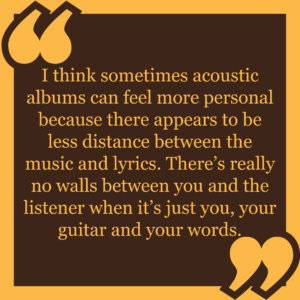
TrunkSpace: “The Gleaner” is due out in June. Where have you seen yourself grow the most as a songwriter with this album compared to your debut?
Dente: These two albums are night and day. The first one, “Leave Your Ghosts Behind,” was a culmination of songs written over an eight-year period. It was simple. I was fighting and confronting my perfectionism, and thought, if I don’t do this now, as it is, I will never do it. The album title comes from my statement about leaving old things in the past; the things that were crippling me to move on, move forward. It was probably more about me trying to make myself accountable to others to choose to do that every day… not because I had already left all my ghosts behind. It’s a daily practice, not a one and done. I’m still leaving my ghosts behind, every single day. But it helped to have proclaimed that that’s what I aim to do. So my friends Andy and Collin Demos offered to provide the space and tools necessary to record an acoustic “living room album.” We did it chunk by chunk over a couple weeks, with a few major sessions. I used no click track, which was both a blessing and a curse. I wanted to not be constrained by the timing of a metronome, since I felt this collection of songs needed to breath and come naturally. So I would record the guitar and the vocals together, the guitar mic’d, and then add hand percussion and harmonies over it, having to feel out the tempo at times and hope everything landed well due to the timing-imperfections. Listening back on it is pretty difficult for me, because I can hear all these little imperfections and zero in on them, but when I zoom out and look at the project as a whole, it’s a perfect representation of me at the time. Cracked, vulnerable, beautiful, and trying anyway, despite all my doubts. I’m proud of what it is because it’s exactly what I could do at the time with what I had. I’m really grateful to Andy and Collin for catalyzing that experience. “The Gleaner,” in contrast, is a strong and feisty statement. It also contains some older songs of mine, but this grouping is held together by a theme, encouraged by my producer, Dan Matlack. Dan has helped to bring together my songs and create a cohesive experience. During pre-production, I was playing a couple songs not intended for the album, and he said “you need to record those.” I was skeptical of them, and thought of them as lesser than the songs I had chosen, but realized he was right. There was a lot of cohesion and chemistry with a certain group of my songs, which one could call “Americana” or “country” by some standards. He hails from Texas, and could hear my songs through a lens I wasn’t attuned to. But I’m really glad he picked that out, and was able to direct me toward creating a collection of songs which would blend together in a folky, country, Americana way that resulted in “The Gleaner.” Half the songs are relatively new, the others are older, but I realized that thread of “country” seemed to exist in my songwriting; the gritty, achy, sad, spunky, twangy sound that lives inside of me for one reason or another. Other elements that set this album apart: DEFINITELY using a click track, months of pre-production at Dan’s Mayfair House, and gathering together a band of local musicians who I think are some of the best. We had Zach Westfall on bass, Eric Novod on drums, Stephen Maxwell on guitar, Mark Masefield on Hammond and myself on vocals and guitar. Everyone came together for one day and live tracked nine songs in one session. I didn’t complete the session without a shot of whiskey, but we did it. (I came back to record harmonies separately, and we brought in Mark later.) It was a truly phenomenal process to see these people come in and bang out these songs together in one day, having a blast in the process. I count myself lucky for that. Dan did an excellent job at curating the group of musicians to work together and weighing in on the development of the songs with a full band vs. my solo acoustic versions of the songs. The title of the album came to me early on, before we began recording. The songs were a representation of experiences-turned-songs over a long and arduous period of time, that resulted in a beautiful manifestation in the form of an album. I consider myself a gleaner in the fields, taking what’s left, after the harvest has commenced and the vultures have picked at the ground. It didn’t come quickly, but I feel what was reduced down over the years amounted to something good and worth highlighting. In reality, at the time, I felt my songs were all I really had. I lost my childhood home, a sense of place and identity, I left a place I lived for two years, was just aloof in the world trying to make something happen. I felt the metaphor of a gleaner in a field was totally appropriate.
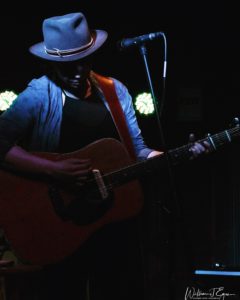
TrunkSpace: “Leave Your Ghosts Behind” was a very personal album. How does “The Gleaner” compare to it in that regard?
Dente: They are both very personal. I think sometimes acoustic albums can feel more personal because there appears to be less distance between the music and lyrics. There’s really no walls between you and the listener when it’s just you, your guitar and your words. There is absolutely no difference in the sincerity of my songs and songwriting between albums. I don’t think by adding a full band to the mix, my songs will be less personal to the listener, but there certainly is a different energy about “The Gleaner.” It’s going to provide a different experience. But my sincerity is certainly in tact. It’s also really great to see how a song can grow and morph when other musicians are playing along, because everyone is bringing their own experiences and fingerprint to the sound, which creates such a cool result. It changed the way I feel about collaborating, and made me more open to giving up some control over the whole process of recording. I’m grateful for Dan’s pursuing working with me on this project.
TrunkSpace: When you’re performing a song live that you have a strong emotional connection to, is it important to let those emotions out in the performance itself? Do you feel a song as much as you sing a song?
Dente: Oh god, it’s make or break. The song will always be the song. The chords stay the same, the lyrics (unless drunk or aloof) stay the same. What I try to do to bring out the emotion and excitement that was present the day I wrote the song, is put myself in that mindset again. Why was I writing it? What was I going through? It’s possible to get into that headspace, and have the same emotions channeled and filtered through those thoughts. Much like an actor preparing for a role. What if an actor let their lines slip a little, just that one time, just because they were tired from the performance before that one or they thought there weren’t enough people in the room to give them the best acting they’ve ever seen? 100 percent every time, no matter what. Sometimes though, it is hard. If a song is written about a really intense thing, it can be too overwhelming to access those same emotions every time. I often don’t play certain songs unless I’m completely committed to singing it that night, otherwise it will fall short. I think it’s a balance of being moved by your own song enough to give a good performance, while not thrusting yourself into near trauma while doing it! Not always easy. Others might have a different perspective on this one. All I know for myself is if I’m going to go through the effort of lugging my gear to the venue, setting up, and getting in front of people who made time to see you perform, I’m going to respect their time and respect my own song enough to sing it the very best I can: to give a gift to the audience of my sincerity, emotion, and skill. Every time you play the song, it’s a new song. You just wrote it. You’re excited about it. Someone in front of you may be hearing it for the first time, and wouldn’t you want them to hear it as its best version?
TrunkSpace: As a solo artist, do you ever get an artistic hankering to collaborate with other musicians or is songwriting a solitary act for you?
Dente: Songwriting is very much a solitary act for me. However, as I mentioned in a previous statement, I have been introduced to the act of collaboration through the recording of “The Gleaner” and working with Dan Matlack. And I realized it is so valuable. I’m very protective of the songs I write and consider it a sacred act. But I also realized music is nothing if not shared, including the writing process. When I’m excited about a fellow musician, I get excited about the idea of writing together. But that is definitely still uncharted waters for me! It’s just a new skill to acquire. I’ve only ever written alone, so that’s all I know… so far.
TrunkSpace: As a songwriter, have you ever thought about writing songs for other artists in that sort of classic Nashville songwriter role?
Dente: No. I’m even hesitant to cover songs myself. My theory is that the person who wrote the song has the perfect voice for the song. However, sometimes a musician going outside their comfort zone to cover a song that is not written or performed in their own style, can result in a really cool discovery of new roads to take in vocal and instrumental writing. Realizing, for instance, that your voice is capable of a certain trill or vibrato or even holding a note longer than you normally would. Or using a jazzy chord that you’re not familiar with, opening a Pandora’s box of songwriting and inspiration. I think others can have huge talents for writing to a musician’s strengths, writing for others based on intuition or even to a formula. But I know that I’m not drawn to that, at least not so far. Again, I’m hesitant to cover a song but the exception is when I love the song so much and it resonates with me on a personal level, to the extent that I can “make it my own.” If I don’t have that drive, I leave it alone. One of my favorite artists is Nick Drake, who wrote “Road”. I covered it, and love playing it, but also have so much reverence for it that I will scarcely cover it unless moved to do so. He deserves that. Also, it DID take some of the magic away. However, I’m grateful for being able to have learned that song because it’s like my fingers are tracing where his fingers were on the strings, and I feel connected to him through that.
TrunkSpace: You started out on piano. Do songs ever originate there now or do you write exclusively on guitar?
Dente: I haven’t played in a while. The piano is associated with perfectionism for me. As I move on from that way of living and seeing, I think I’ll be able to return it at some point. It is such a gorgeous sound. Being alone in a room with a grand piano is a pleasure like none other. I really respect musicians like Regina Spektor for taking her training and totally making it her own. I mentioned before that I was interested in jazz piano for a while, and I think if I returned to the piano, I would want to with the opportunity to study theory in that capacity… to dive back in, but with new tools. Otherwise, I’m afraid I would cycle through old tricks and feel stuck again. Jazz is intriguing and open. I want piano to be an instrument of freedom, not confinement, and I think jazz is just the tool to achieve that. I also can imagine adding some piano to future recordings, whether by my hand or bringing in someone like Matt Wade. Matt and I have discussed collaborating. I’m sure that’s going to happen in the near future.
TrunkSpace: What approach do you take to marketing your music?
Dente: For a while I took the approach of no approach. I didn’t have intentions for my music beyond it just being heard by humans in person, until recently. I had been in Vermont for a while and just moved back this January. There was a period of time of about three months that it took for me to be certain that it was really time to give music a try, professionally. It’s been a slow process (hence, the “gleaner”) for me of allowing myself to have space, freedom, time to think, time to play, balancing professional life as a mental health worker with being a musician, finding my passion and footing to come to this point. I wanted to feel a firm footing before diving into something that felt inherently unstable to me. For me, music is emotion. It was and is one of the only outlets I have that doesn’t involve expectations, pressure or rules. I wanted to make sure I protected that. And now I’ve gotten to the point that I know I will not be happy or be able to live with myself if I don’t give this the attention it deserves while I have the energy to do it. If music doesn’t “work out” (read: people don’t really care that much about it/ it no longer feels worth my while / it takes away everything I love about it), then I’ll stop and I’ll know it’s time for grad school. I still have ambitions of going back to school to focus more on psychology and one day get a masters in counseling or music therapy, or something like that. I know I have value in that realm and feel fulfilled by it. But grad school is there, and it can wait. For one reason or another, there is momentum in my life with music and it’s the time to do it. So I’m working hard and hoping for the best. Really, the “best” is just that I give everything I can and people enjoy my music as much as I love playing it. But I’m glad that I’m not at a point of fragility emotionally that if I’m not embraced by the world for my music, it will not break me and certainly won’t stop me from writing, and I’ll go on with my life. Even if nothing ever happened outside of this town and the people I know, I’m grateful for having been embraced by them and appreciated for my music here. That’s where is starts: in a small community of people who love and care about you. Everything that comes after that is secondary. It’s all about connecting with people. Music is nothing if it can’t be shared and heard.
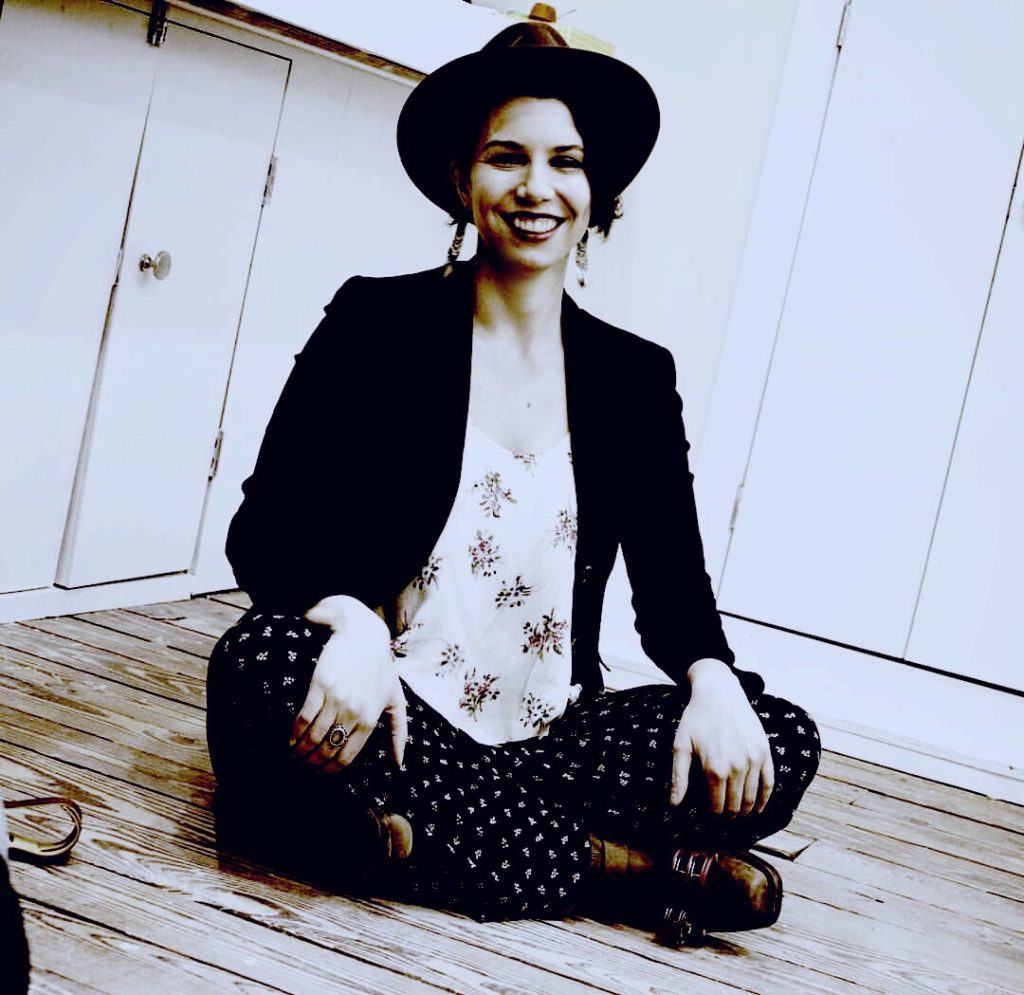
TrunkSpace: As you prepare to release “The Gleaner” in a couple of weeks, do you find yourself placing expectations on it in terms of how you hope it will be received?
Dente: I definitely want this album to be heard nationally. I want people in other states to hear the album on their radio station and ask, “Who is that? I’d love to hear her live!” For me what I want to come out of this is to be able to play for more diverse crowds all over the country, at festivals, outdoors, in theaters, in coffee shops, wherever I can. I plan to start setting up a small tour for the fall. I want to see the country, and what better way than to do that on the heels of sharing my music!
TrunkSpace: Is there a particular artist/songwriter that you’d like to have your career mirror, at least in terms of the level of success/notoriety?
Dente: I really respect Brooke Fraser, Sarah Jarosz and Brandie Carlile as examples of people who built their careers on good songwriting, hard work and personal integrity. They are all in or near their 30s and I think slow and steady is the way. I’m almost 29, and I wouldn’t have been ready before now to do what I’m doing. I have more grit and self-knowledge than I ever have, and will need that to get through the ups and downs of being a performer, or attempting to be.
TrunkSpace: What can fans expect from Tara Dente for the rest of 2017?
Dente: They can expect me promoting the shit out of “The Gleaner”! I’m very proud of it, and want people to hear it. I’m going to be planning to break out of my circuit here in Asbury Park and play Philly, NYC, and other cities on the east coast, and eventually beyond. I just signed with a label in Virginia called Travianna Records. It’s a development deal, so they are going to be working with me to do even more than I could on my own to succeed in my budding career as a musician.
Here is a link to Travianna: http://www.traviannarecords.com/
And a link to pre-order the album: https://itunes.apple.com/ca/artist/tara-dente/id578308029
Featured Photo And Video By The Echo Spectrum.


